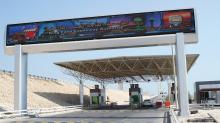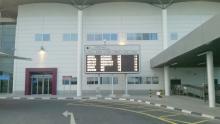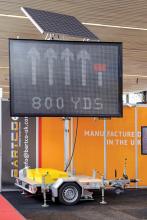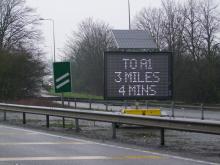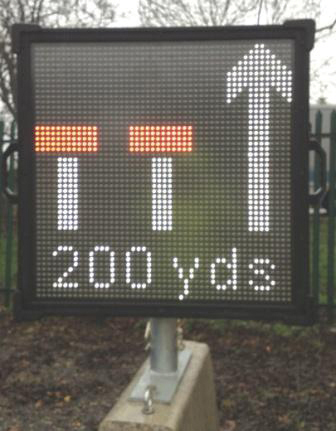
VMS for what is thought to be the longest road tunnel in the Middle East, and the installation of the latest VMS technology in Canada’s oldest national park to help motorists travelling through it are among the projects discussed by Guy Woodford
A large volume of VMS from Italian firmPart of the US$1.36 billion (Dh5bn) four-stage Zayed Street upgrade, which began in October 2007, around 20% of the 7,000 vehicles travelling through Zayed Street during peak week day hours (7am-9am, 3pm-5pm) are reportedly expected to use the new four-lane in each direction Tunnel.
Solari’s director Alberto Vazzoler said it had been of great significance for the Udine, Italy-based firm to take part in the creation of the December 2012-opened Zayed Street Tunnel, as it formed a critical part of the whole Zayed Street upgrade, widely regarded a key prestigious project for the whole Middle East.
“Moreover, it is very important that we have been chosen by such an important city like Abu Dhabi because our LED signs are among the most visible items of the project. They are considered not only for their traffic safety functionalities but also for the aesthetics,” said Vazzoler. “LED signs are also considered a kind of luxurious urban furniture that not every customer can afford with such big numbers.”
Vazzoler said that that the construction of the Zayed Street Tunnel was another project under NTCIP (
“It's not an easy protocol to implement for signs but it gives the opportunity for customers to get rid of proprietary protocols, therefore they can easily control signs from any traffic control system running NTCIP, and they can also add signs from other vendors without spending additional money for interfaces to integrate new signs in the existing system,” he said.
The Zayed Street Tunnel project is not the first project Solari has been involved with in Gulf Cooperation Countries (GCC). Similar VMS installations have been made in Kuwait and Saudi Arabia. Vazzoler said: “This project is confirmation of Solari’s quality. Factors such as extreme temperatures, salty moisture, winds and sand make it challenging to design and manufacture equipment to last a minimum of 10 years with the same optical features.”
U.S. firm
A system of 3.4cm full-colour Vanguard VF-2420 dynamic message signs are now a feature on the Trans-Canada highway in Banff National Park, near Calgary, Alberta.
Parks Canada and the Alberta Ministry of Transportation contracted DMD & Associates, to integrate the display system. The displays show variable weather-related messages to travellers as they ascend around 426.72m into the mountains from Calgary.
“As they're within the national park, two of the three displays are overseen by the federal Canadian government and the third is just outside the eastern border, placing it under the control of the Alberta Ministry of Transportation.
“So, it's a uniquely complex DMS project and I'm convinced that Daktronics was the clear choice," said Don McLean, president of DMD.
According to the Alberta Ministry of Transportation, this particular section of the national highway system is critical to the movement of goods and people which strengthen the country's economy. Because the weather can be drastically different between Calgary and Banff, the Daktronics dynamic message signs were installed to inform and warn motorists of the conditions ahead.
DMD are said to have chosen the high-resolution technology, 34mm as opposed to the typical 66mm, because of its ability to show multiple-line messages with French/English text along with sharper graphics.
Dr. Alison Smiley, of Human Factors North, a noted scholar of human factors in commercial and public systems, worked with DMD to develop their plan for the project. Her research is said to have defined many best practices for helping motorists comprehend messages on roadway signs.
DMD is said to have requested a full-colour display for its ability to show the French and English translations in separate colours – a practice backed by Dr. Smiley's research.
Located 109.43km west of Calgary, Banff National Park was established in 1885 and covers 2,554m² in the Canadian Rockies. On average, more than 4 million travellers visit the park each year.
In the U.S., Daktronics has installed six full-colour LED message displays at Kansas City International Airport (KCI) to inform and guide arriving motorists. The AF-3500 displays, installed along KCI’s inbound driveway, are said by Daktronics to reduce circulation congestion by directing motorists to their destinations within the airport site.
The displays’ full-colour technology is said to allow KCI to show colour-coded terminal labels (A, B and C) along with their corresponding airlines. These displays also carry gate changes and publish announcements, security information or welcome messages aimed at generating customer satisfaction.
Each of the new AF-3500 message centres have replaced Daktronics monochrome line-matrix displays which had been installed at the airport for nearly two decades. The upgrade involved fitting the new displays to the existing structures along with the installation of new fibre-optic cabling and Venus 1500 control software.
Unlike Retroreflective systems which can only display pre-defined signs, Nissen MultiSign can be used to display any TSRGD and Chapter 8 traffic sign by using NiCo-Nissen Communication, Nissen’s web-based bespoke software.
Nissen’s MultiSign system features a solar powered VMS panel which can either be mounted on a concrete barrier or on a purpose-built housing for central reserve. The system uses the latest Surface Mount Device (SMD) LEDs, said to use up to 40% less power than conventional LEDs, while also offering a wide viewing angle.
Using Bluetooth (wireless) Nissen remote control (similar to the remote control used for Light Arrows mounted on Impact Protection Vehicles), traffic management operatives are said by Nissen to be able to select the appropriate wicket sign for each of the MultiSign from the hardshoulder without crossing the carriageway.
To activate the signs, a small radio remote (key fob) control is used by the operatives. The signs are said to be easy to switch On/Off by pressing the small remote while driving by or from the hardshoulder. This is said to enable the operatives to implement overnight lane closures within minutes without having to cross the carriageway. The conventional methods of installing lane closures are not only said by Nissen to pose a risk to a workforce crossing the carriageways, they also take up valuable time before the lane closures can be deployed. Nissen claims the MultiSign can help prevent 24 carriageway crossings per night per closure.
According to
The performance of offside fixed signs at night is limited by headlight illumination characteristics. The design of the MultiSign display was said by Nissen to be based on maintaining a size which would be no less conspicuous and readable than a fixed conventional sign, as well as being of a size and weight small enough to be installed safely and fit within the central reserve strategy of the M25 works.
Nissen says that Aggregate Industries have confirmed that the MultiSign system, which they have been using for several months, has been reliable and recorded no near misses or any other incidents since its introduction.
Using NiCo- Nissen Communication, the signs can be controlled and monitored from any location using an internet connection. Additionally, Nissen says it has the capability to provide a complete traffic management solution including traffic counts, queue detection and warning, and a communication link to, for instance, the MIDAS (Motorway Incident Detection and Automatic Signalling) system.
SHB and Mobile VMS join forces
SHB, a specialist and LCV vehicle Hire Company, and Mobile Variable Message Signs (Mobile VMS) have joined forces to offer VMS through SHB’s 13 UK depots.
Mobile VMS produce more than 100
The addition of Mobile VMS is said to align with SHB’s current specialist products and further supports its highways infrastructure and event organising customers who want the ease of hiring everything through one contact point.
“We hope by offering Mobile VMS products to our customers we can provide a quick and robust solution for vehicle and sign requirements through one easy phone call," said Mike Street, SHB managing director.
Ciaran McAteer, sales director at Mobile VMS, said: "Mobile VMS are proud to be joined with SHB; it's a perfect venture and fits with SHB’s high quality products."

